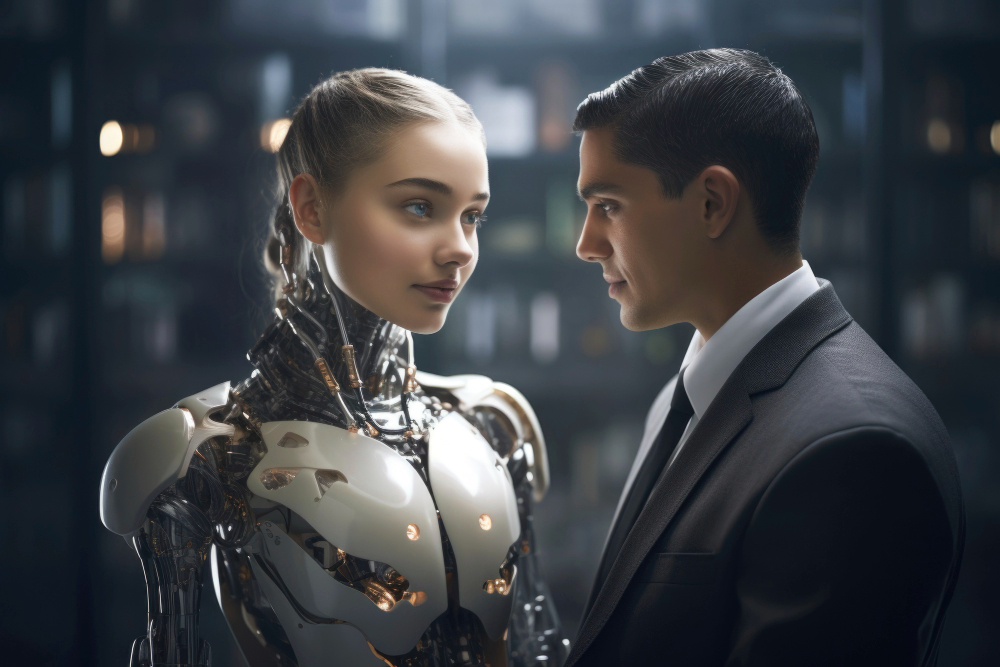Will AI Replace Marketers? The Future of AI in Digital Strategy

The rapid rise of artificial intelligence has sparked a significant debate across many industries: will AI replace human jobs? For marketing professionals, this question hits particularly close to home. With AI tools now capable of writing copy, analyzing vast datasets, and even optimizing ad campaigns, it's natural to wonder about the future role of human marketers in an increasingly automated landscape.
This isn't a simple "yes" or "no" question. The reality is far more nuanced. While AI is set to transform the marketing industry, it's unlikely to make human marketers obsolete. Instead, it will redefine their roles, shifting the focus from tedious, manual tasks to high-level strategy, creativity, and human-centric connection.
This post will explore the current capabilities of AI in marketing, particularly its impact on SEO, and offer a balanced perspective on how it will augment—not replace—the work of marketing professionals. By understanding how to leverage AI, marketers can secure their place in the future of digital strategy.
What Can AI Do in Marketing Right Now?
AI is already making a significant impact on various marketing functions. By automating processes and providing deep insights, AI tools are allowing marketing teams to work more efficiently and effectively.
Content Creation and Optimization
One of the most talked-about applications of AI is in content generation. AI writing assistants can draft blog posts, social media updates, and email campaigns in seconds. Beyond initial creation, these tools excel at optimization. AI for SEO can analyze top-ranking content to identify keyword gaps, suggest structural improvements, and ensure copy is optimized for search engine algorithms. This frees up human writers to focus on more creative aspects like storytelling, brand voice, and developing unique angles that resonate with an audience.
Data Analysis and Insights
Marketing is driven by data, but the sheer volume of information can be overwhelming. AI algorithms can process and analyze enormous datasets from various sources—like website analytics, social media, and customer relationship management (CRM) systems—at a speed no human can match. AI can identify trends, predict customer behavior, and uncover hidden patterns, providing marketers with actionable insights to inform their strategies. This allows for more precise targeting and personalized campaigns.
Personalization at Scale
Modern consumers expect personalized experiences. AI makes it possible to deliver this level of customization at scale. By analyzing user data, AI can tailor website content, product recommendations, and marketing messages to individual preferences. For example, e-commerce sites use AI to suggest products based on a user's browsing history, while email marketing platforms can send automated, personalized follow-ups triggered by specific customer actions.
Where AI Falls Short: The Human Element
Despite its impressive capabilities, AI has significant limitations. These limitations highlight the irreplaceable value that human marketers bring to the table.
Lack of Genuine Creativity and Empathy
AI can mimic patterns and styles, but it cannot replicate genuine human creativity or empathy. It doesn't understand culture, humor, or the subtle emotional nuances that build a real connection between a brand and its audience. A compelling brand story or a marketing campaign that truly resonates on an emotional level requires a human touch. AI can generate text, but a human marketer understands the why behind the message.
Strategic and Critical Thinking
AI is a powerful tool for execution, but it isn't a strategist. It can analyze data and suggest optimizations, but it can't set overarching business goals, navigate complex market dynamics, or make intuitive leaps based on experience and industry knowledge. Strategic thinking involves weighing trade-offs, understanding the competitive landscape, and aligning marketing efforts with broader company objectives—all tasks that require human judgment and foresight.
Building Relationships and Trust
At its core, marketing is about building relationships. Trust is a crucial component of any successful brand-customer relationship, and it's built through authentic communication, ethical behavior, and consistent value delivery. AI can automate communication, but it can't build genuine rapport. Human marketers are essential for engaging with customers on social media, managing community forums, and representing the brand in a way that feels authentic and trustworthy.
The New Role of the Human Marketer: The AI-Powered Strategist
Instead of viewing AI as a threat, marketers should see it as a powerful collaborator. The future of marketing belongs to those who can effectively integrate AI into their workflow, using it to enhance their own skills and capabilities.
The role of the marketer will evolve from a "doer" to a "director." Instead of spending hours on manual tasks like keyword research or A/B testing ad copy, marketers will oversee AI tools that handle the execution. This shift allows them to focus on higher-value activities:
- Developing Strategy: Setting the creative vision and strategic direction for campaigns.
- Interpreting Data: Using AI-generated insights to make informed strategic decisions.
- Brand Storytelling: Crafting compelling narratives that connect with audiences on an emotional level.
- Ethical Oversight: Ensuring that AI is used responsibly and that campaigns are aligned with brand values.
By embracing AI for SEO and other marketing functions, professionals can become more strategic, creative, and ultimately, more valuable to their organizations.
Prepare Your Marketing for the Future
The integration of artificial intelligence is not a question of if, but how. AI will not replace human marketers; it will empower them. By automating repetitive tasks and providing powerful analytical capabilities, AI frees up marketing professionals to focus on what they do best: thinking creatively, developing strategy, and building meaningful connections with people. The most successful marketers of the future will be those who learn to partner with AI, using its power to amplify their own human ingenuity.
If you're looking to harness the power of AI for SEO and enhance your digital strategy, it's essential to work with a team that understands both the technology and the human element of marketing.
Ready to see how AI can transform your SEO results? Contact REK Marketing & Design today for a consultation and let's build the future of your marketing strategy together.